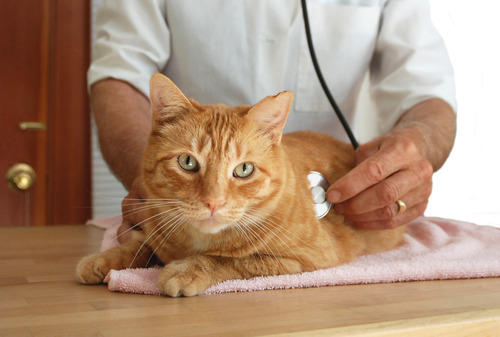When it comes to our pets, it’s natural to worry about their well-being and try to understand their behaviors. Unfortunately, pets can’t tell us when something is wrong, making it essential to be alert to certain signs of an emergency. This guide will walk you through the top indicators that your pet may need immediate care to help you make the best decision for your pet’s health. If you ever feel uncertain about your pet’s condition, contact Chimacum Valley Veterinary Hospital at (360) 385-4488 or book an appointment online.
1. Difficulty Breathing or Choking
Breathing issues in pets are always concerning, as they can quickly become life-threatening. Dogs and cats typically breathe smoothly and without visible effort, so any change—such as wheezing, gasping, or labored breaths—may indicate a serious issue. Difficulty breathing can be caused by a range of factors, from allergic reactions and foreign objects in the throat to lung issues and heart disease. For pets who appear to be choking, do not attempt to remove the object on your own, as this could cause further injury. Promptly visiting an emergency vet is the safest course of action to ensure your pet’s airways are clear and that they can breathe comfortably again.
2. Persistent Vomiting or Diarrhea
While occasional stomach upset is common in pets, frequent vomiting or diarrhea may signal a more severe issue. Persistent symptoms could point to underlying conditions such as pancreatitis, gastrointestinal obstructions, or poisoning. In addition to monitoring frequency, be alert to the presence of blood in vomit or stool, which could indicate internal bleeding or trauma. Severe vomiting and diarrhea can quickly lead to dehydration, putting your pet at risk. At Chimacum Valley Veterinary Hospital, our emergency vet team can assess your pet’s condition and provide the care needed to stabilize them.
3. Visible Pain or Limping
If your pet appears to be in pain, is favoring one limb, or has difficulty moving, they may need emergency care. Pets sometimes attempt to hide pain, making it difficult to know when they are truly in distress. Signs to watch for include vocalizations such as whimpering or yelping, hesitation to walk or jump, or an unwillingness to move at all. Limping can result from broken bones, sprains, or even spinal issues, which may require immediate attention. Consulting with an emergency vet can help determine whether your pet has suffered a significant injury and requires immediate treatment to prevent further damage.
4. Swollen Abdomen or Bloating
A swollen abdomen can be a severe, potentially life-threatening condition in pets, especially dogs. Bloating, also known as gastric dilation-volvulus (GDV), is a dangerous condition where the stomach fills with gas and twists. This cuts off blood flow, leading to tissue damage and possible shock. Pets with GDV will show signs such as a visibly distended abdomen, excessive drooling, restlessness, and unsuccessful attempts to vomit. Rapid intervention by an emergency vet is critical to treat this condition. The team at Chimacum Valley Veterinary Hospital is experienced in identifying and managing emergencies like GDV to give your pet the best chance of recovery.
5. Unusual Bleeding or Injury
Pets are naturally curious and can sometimes injure themselves. However, certain types of injuries warrant a trip to the emergency vet. If you notice open wounds, heavy bleeding that does not stop within a few minutes, or bleeding from unusual areas like the nose, gums, or ears, it’s time to seek professional help. Bleeding can be a sign of trauma, ingestion of harmful substances, or clotting disorders. Additionally, if your pet has suffered a trauma, such as being hit by a car, they may have internal injuries not visible to the eye. Our emergency vet team is equipped to perform thorough exams and provide the appropriate care to address any internal or external injuries.
6. Seizures or Collapsing
Seizures in pets are frightening to witness, especially if it’s the first time. They often involve convulsions, loss of consciousness, or involuntary movements, and they can be a symptom of underlying issues, including epilepsy, toxins, or head trauma. While a single, brief seizure may not always indicate an emergency, multiple or prolonged seizures, known as status epilepticus, can be dangerous. Collapsing without explanation or remaining lethargic after a seizure may indicate a life-threatening situation that requires immediate care. The emergency vet team at Chimacum Valley Veterinary Hospital is skilled in managing seizure-related emergencies and can work to determine the cause and stabilize your pet.
7. Exposure to Toxic Substances
Pets often explore their surroundings by sniffing, licking, or chewing. Unfortunately, this can expose them to harmful substances such as certain foods, household chemicals, plants, and human medications, which can all be toxic to pets. If you suspect your pet has ingested something potentially toxic, it’s essential to act quickly. Some of the most common toxins include chocolate, xylitol (found in sugar-free products), grapes, antifreeze, and specific human medications. Symptoms of poisoning can include vomiting, lethargy, drooling, and seizures. Immediate treatment from an emergency vet can reduce the effects of the toxin and potentially save your pet’s life. Contact Chimacum Valley Veterinary Hospital if you’re concerned about possible poisoning.
Taking Action When Your Pet Shows Concerning Symptoms
When pets display any of the signs mentioned above, it’s often best to err on the side of caution and consult with an emergency vet. Many of these symptoms can indicate severe underlying issues that require prompt medical intervention. Emergency care allows veterinarians to assess, diagnose, and begin treatment right away, increasing the likelihood of a positive outcome. For dedicated, compassionate emergency care, reach out to Chimacum Valley Veterinary Hospital in Port Hadlock, WA, by calling (360) 385-4488 or booking an appointment online. Your pet’s health and comfort are always our priority, and we’re here to provide the professional support you need when it matters most.





